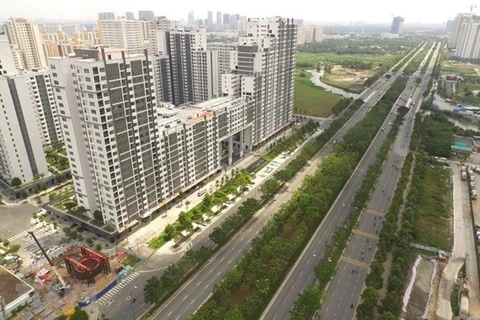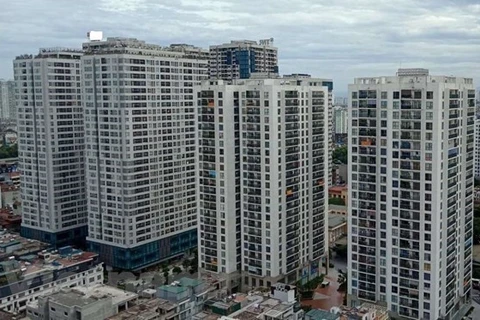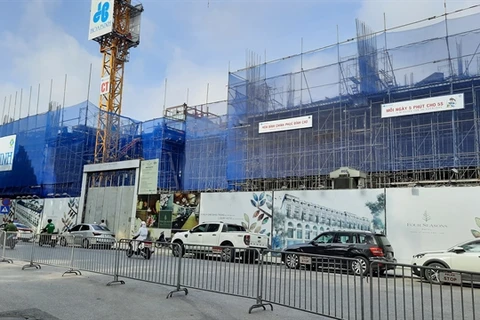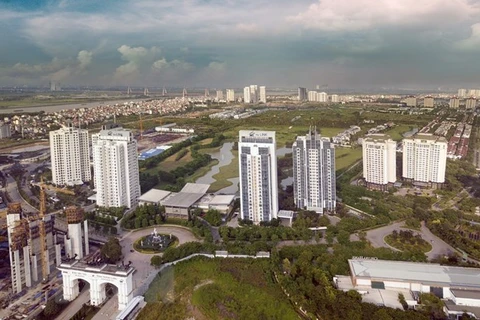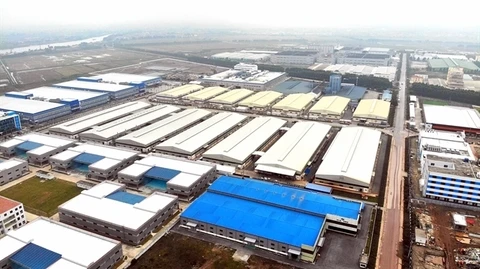 A view of buildings in Hanoi. In 2020, the real estate sector contributed about 4.42 percent of the national GDP (Photo: vneconomy.vn)
A view of buildings in Hanoi. In 2020, the real estate sector contributed about 4.42 percent of the national GDP (Photo: vneconomy.vn) The industrial property segment can be considered a bright spot of the domestic market for many reasons such as the European Union - Vietnam Free Trade Agreement (EVFTA) coming into effect and plans for the relocation of many multinational corporations to Vietnam, according to the ministry.
Meanwhile, Vietnam's successful disease control is also an important factor to attract more foreign investment.
Those factors would set a good foundation for the real estate market to develop stably in 2021, a representative of the ministry said.
In the fourth quarter of 2020, most businesses in the real estate sector started operating again.
Although the market still faces many difficulties, real estate developers have offered solutions to attract customers like changing areas for developing property projects to catch up with trends of shifting FDI inflows and urbanisation in localities outside big cities, according to the ministry.
Thanks to product handover activities, project share transfers, asset liquidation and the development of industrial real estate, some real estate businesses gained record profits.
Nearly 80 large listed real estate companies achieved or exceeded their after-tax profit goals.
The domestic real estate market in the fourth quarter of 2020 strongly increased compared to the deep reduction in previous quarters of last year due to the rapid recovery of the housing and industrial zone segments, helping the property sector maintain positive growth for 2020.
In 2020, the real estate sector contributed about 4.42 percent of national GDP.
In 2020, the real estate industry also had changes in businesses. Accordingly, the number of newly-established enterprises was 6,694, down 15.5 percent compared to 2019, while 978 enterprises completed dissolution procedures.
According to the Ministry of Construction, the total outstanding debt of the real estate sector in 2020 increased quarter by quarter. Specifically, the debt reached 8.3 trillion VND (361 million USD) in the first quarter and hit 8.5 trillion VND in the second quarter and 8.6 trillion VND in the third quarter. As of December 31, 2020, the debt reached more than 8.8 trillion VND.
Besides banking loans, property companies in 2020 attracted capital from other sources such as individual investment capital, remittances and capital from issuing stocks and bonds.
Regarding supply and transaction of real estate products, the ministry's representative said by the end of the first quarter of 2020, apartment inventories on the market were estimated at nearly 13,000 units.
In the second and third quarters, the negative impact of the COVID-19 pandemic, as well as problems in terms of mechanisms and policies, affected the progress of implementing investment procedures of property projects and also the progress of implementing those projects. So, the market did not have significant growth of new supply in those quarters.
However, the real estate market was still a safe investment channel so apartment inventories reduced to 6,000 units at the end of the third quarter of 2020.
Entering the fourth quarter, the market had a new supply of nearly 30,000 apartments and transactions were still quite stable.
The ministry reported that last year, the domestic market had a total inventory of apartments of about 9,000 units nationwide. Of which, the localities with large inventory included Da Nang, Khanh Hoa, Kien Giang and Binh Duong.
Meanwhile, the property market in Hanoi, HCM City, Quang Ninh and localities with strong urbanisation such as Can Tho, Long An and Dong Nai maintained stable development with a moderate level of apartment inventories./.
VNA
